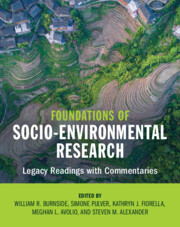Book contents
- Frontmatter
- Dedication
- Contents
- Contributors
- Foreword
- Acknowledgments
- Introduction
- Part I Early Classics of Socio-Environmental Research
- Part II The Roots of Socio-Environmental Research in Geography and Anthropology
- Part III Socio-Environmental Research in Economics, Sociology, and Political Science
- Part IV Socio-Environmental Research in Ecology
- Part V Ethical, Religious, and Historical Approaches to Socio-Environmental Research
- Part VI Technology, Energy, Materials, and Socio-Environmental Research
- Conclusion
Part IV - Socio-Environmental Research in Ecology
Published online by Cambridge University Press: 18 November 2022
- Frontmatter
- Dedication
- Contents
- Contributors
- Foreword
- Acknowledgments
- Introduction
- Part I Early Classics of Socio-Environmental Research
- Part II The Roots of Socio-Environmental Research in Geography and Anthropology
- Part III Socio-Environmental Research in Economics, Sociology, and Political Science
- Part IV Socio-Environmental Research in Ecology
- Part V Ethical, Religious, and Historical Approaches to Socio-Environmental Research
- Part VI Technology, Energy, Materials, and Socio-Environmental Research
- Conclusion
Summary
As the study of our “house,” ecology considers interactions between humans and our environments. Hutchinson noted modern society’s effects, including from overconsumption, on the major cycles of nitrogen, carbon, and other elements, foretelling research on the Earth system. A major driver is agriculture, including the scale of pesticide use, an alarm sounded by Rachel Carson in Silent Spring. Industrial agriculture keeps crop ecosystems in a perpetual early state, Odum contends, trading off calorie production for services provided by more-mature ecosystems, such as water purification. Holling showed that ecosystems can exist stably in different states and be resilient to impacts. Pastoral ecosystems may not have a single equilibrium state, as shown by Ellis and Swift, with implications for development. Species play various roles in ecosystems, and their loss can affect key services, as noted by Ehrlich and Mooney. Conserving biodiversity will benefit from Indigenous knowledge, argue Gadgil and colleagues, including knowledge of the shifting baseline of fisheries, notes Pauly. As Earth urbanizes, rural to urban gradients present a growing research opportunity, McDonnell and Pickett argue.
- Type
- Chapter
- Information
- Foundations of Socio-Environmental ResearchLegacy Readings with Commentaries, pp. 431 - 440Publisher: Cambridge University PressPrint publication year: 2022

